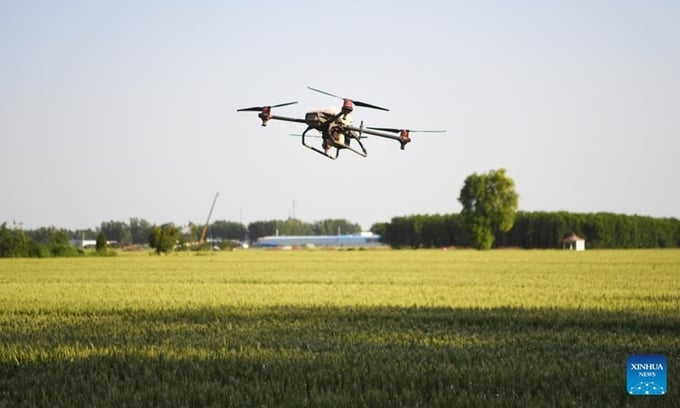June 5, 2025 | 04:01 GMT +7
June 5, 2025 | 04:01 GMT +7
Hotline: 0913.378.918
June 5, 2025 | 04:01 GMT +7
Hotline: 0913.378.918

A drone is used to manage a wheat field in Lizhuang Village, Senggu Township, Yanjin County of Xinxiang City, central China's Henan Province, May 17, 2022. In Yanjin County, a group of agricultural experts reached out to local farmers, offering instructions on farmland management, to help them attain a bumper harvest. Photo: Xinhua
This is a scene taking place all across China during spring plowing. Localities are refining field management to lay a good foundation for grain harvest, as food security is a priority for the country. The digitalization of agriculture has accelerated in China to help the development of modern agriculture and rural vitalization.
The "No.1 central document," the first key document released by the central government every year, which was published last week, stressed in-depth implementation of digital rural development, the acceleration of the application of big data in agriculture and rural areas, and the promotion of smart agriculture.
It said that projects will be carried out to boost agriculture through the use of more resources and the "Internet Plus" strategy to send agricultural products from villages to cities.
Many enterprises have started their layout in smart agriculture. Beidahuang Group, China's largest agricultural business, held a meeting on Saturday, vowing to continue to tackle "bottleneck" technologies in the seed industry and the industrial application of biological breeding.
The company said it will accelerate construction of digital and unmanned farms as well as national-level manufacturing and application demonstration zones for high-end intelligent agricultural machinery and equipment.
This is seen by Wang Peng, a research fellow at the Beijing Academy of Social Sciences, as an application of agricultural digitalization in the upstream of industrial chains.
"Agricultural infrastructure, farmland water conservation and biological breeding can be improved through digitalization. For grain planting in the midstream, daily monitoring, early warnings of meteorological and hydrological conditions, and more intelligent guidance on the procurement and application of fertilizer, can all be realized through agricultural digitalization to increase efficiency," Wang told the Global Times on Sunday.
One of the most visible achievements of digitalization in agriculture is e-commerce, which has helped farmers in rural and remote areas sell their products all around the country.
A livestreamer surnamed Zhou from Donggang, Northeast China's Liaoning Province, told the Global Times that she came back to her hometown in 2019 to sell strawberries online through live-streaming, helping Donggang strawberries be sold nationwide.
"Now express service is fast, which means that it takes only 1-2 days for fresh fruits to be delivered to customers. Strawberries sell very well in winter," said Zhou, noting that e-commerce has helped turn Donggang, a small town, into a strawberry town.
According to statistics from the Donggang Strawberry-growing Association, there are more than 100,000 farmers engaged in strawberry production in Donggang, and the income from strawberries accounts for more than 60 percent of the total income of farmers.
There are 436 professional strawberry cooperatives and 49 family farms in Donggang, with a high degree of standardized production. In 2022, Donggang's strawberry crops covered 201,000 mu with an annual output of 316,000 tons and a value of 6.3 billion yuan ($917 million).
Wang also noted that there are many localities still lagging in digitalization of agriculture. "Regional imbalance remains a problem in advancing intelligent agriculture," Wang said.
(Global Times)

(VAN) Vikas Rambal has quietly built a $5 billion business empire in manufacturing, property and solar, and catapulted onto the Rich List.

(VAN) Available cropland now at less than five percent, according to latest geospatial assessment from FAO and UNOSAT.

(VAN) Alt Carbon has raised $12 million in a seed round as it plans to scale its carbon dioxide removal work in the South Asian nation.

(VAN) Attempts to bring down the price of the Japanese staple have had little effect amid a cost-of-living crisis.

(VAN) Fourth most important food crop in peril as Latin America and Caribbean suffer from slow-onset climate disaster.

(VAN) Shifting market dynamics and the noise around new legislation has propelled Trouw Nutrition’s research around early life nutrition in poultry. Today, it continues to be a key area of research.

(VAN) India is concerned about its food security and the livelihoods of its farmers if more US food imports are allowed.